

 |
 |
|
 |
|
| About Us |
|
Read Past Issues | Resources | Composer Links |
The Curtis festivities culminate on Friday, November 7 when The Kimmel Center for the Performing Arts and The Curtis Institute of Music present the Philadelphia premiere of Rorem's only full-length opera, Miss Julie. Performed by the Curtis Opera Theatre with the Curtis Symphony Orchestra, this is the first presentation of fully staged opera in the intimate and ideally suited Perelman Theatre. Evidence of Things Not Seen will be performed at Columbia University's Miller Theater in New York on Friday night. , Soloist David Geringas plays the German premiere of Rorem’s Cello Concerto in Munich on Thursday. The birthday week brings five additional concerts in New York alone, including “America Honors Ned Rorem,” a gala concert presented by the Magic Circle Opera Repertory Ensemble at Merkin Hall, on October 27. Naxos
has joined the celebration by issuing a disc of Rorem’s three symphonies,
with José Serebrier conducting the Bournemouth
Yet the birthday season offers more than retrospective delights: an abundance of strong new scores testifies to Rorem’s continuing creative vitality. His Cello Concerto found critical and popular favor in its March debut. On October 14 and 15 the Bridgehampton Chamber Players gave the New York City premiere of his new chamber work The Unquestioned Answer at the 92nd Street ‘Y’. The Philadelphia Orchestra introduces his Flute Concerto with principal flutist Jeffrey Khaner under Roberto Abbado, December 4-6 at Verizon Hall. And in the spring, star percussionist Evelyn Glennie gives the premiere of Rorem’s Mallet Concerto with the Madison Symphony Orchestra (March 27 and 28) and the Eos Orchestra (April 8-9). All told, dozens of birthday performances have been planned; the festivities continue well into 2004. An up-to-date calendar can be found at Boosey. Rorem has been called by Time magazine "the world's best composer of art songs" but his work encompasses virtualy all genre. Rorem has composed three symphonies, four piano concertos and an array of other orchestral works, music for numerous combinations of chamber forces, nine operas, choral works of every description, ballets and other music for the theater, and literally hundreds of songs and cycles. He is the author of sixteen books, including five volumes of diaries and collections of lectures and criticism. He
received the Pulitzer Prize in 1976 for his orchestral suite Air Music
He has championed tonality throughout his career in his lyrical yet forthright
music His recent chamber works have been toured or recorded by the Guarneri
String Quartet, the Emerson String Quartet and the Beaux Arts Trio, among
others. Vocal works have been performed and recorded by leading artists
including Susan Graham and Brian Azawa
|
|
the Hip NYC String Quartet
by Deborah Kravetz It’s, uh—Ethel,
a New York string quartet performing a decidedly downtown sort of
music, with distinctly uptown polish and skill, in this new series called
Fresh Ink at the Kimmel Center in Philadelphia.
Composer Todd Reynolds plays violin for Uh,..it all happened so fast, but doesn’t hog the solos, which shift around swiftly and briefly with a bluegrass, toe-tapping sort of energy. There is a percussive and slidey emphasis on the cello, the ensemble is vigorously rhythmic and acoustically amplified. Reynolds’ first composition is a good introduction for this concert and this group. Alap, another piece by Todd Reynolds, captures an Indian raga in blues form, emphasizing long rhythmic line in the cello that is then harmonized in the ensemble, with violin as percussion. Phil Kline’s The Blue Room premiered last year for string quartet and looping boxes, and has since been adapted for CD, effectively doubling the size of the ensemble and providing a continuous stream of sound in the first movement, The River. March is a twitchy, itchy dance rhythm that becomes jagged over a steady bass line. Cello again takes the lead in the third movement, introducing a meditative melodic line picked up in viola and violins and developing some lush sonorities and emotional intensity, and closing with a Tarantella movement. Tiny high notes alternating with fierce scrubbing introduce Julia Wolfe’s Early That Summer; loud, quiet, faster and even more fierce, if that’s possible, then re-developing. The players got quite a workout, but the atonality wasn’t rescued by the rhythmics. Pelimanni’s Revenge , by Timo Alakotila and arranged for the ensemble by member Ralph Ferris, is another bluegrass- sounding piece with a swinging rhythm and a perpetuum mobile loop. Marcelo Zarvos’ Nepomuk #3 is a rapid dance piece with arpeggio plucks in cello and shifting rhythmic patterns that remains cheerful even when the tonality is wistful. The program closed with SweetHardWood by John King, an adaptation of a piece written for the Pennsylvania Ballet. Once past the tu-ning introduction, the first movement did not sound all that different from other compositions on this program–high speed, high energy, ensemble swoops. The composer’s claim for a blues basis and improvisational writing only became evident in the final movement. It’s easy to
enjoy a concert when pieces are short and just varied enough to keep you
guessing; the high energy level throughout was a bonus. Hearing a collection
of new music is intriguing, but people did walk out and the performance
was lightly attended.
Ethel
An Interview with Tobias Picker Handmaid Tale's Debuts in English Rautavaara Joins B&G Who's Afraid of Julia Wolfe Derek Bermel's Soul Garden The Pianist: The Extraordinary True Story of Wladyslaw Szpilman John Adams' Atomic Opera A Bridge Not Far Enough Turnage Signs With B&H Sophie's Wrong Choice Copland's Mexico On Being Arvo Rzewski Plays Rzewski Praising Lee Hyla David Lang's Passing Measures Three Tales at BAM Naxos at 15 On the Transmigration of Souls Dead Man Walking David Krakauer's The Year After Steve Reich/Alan Pierson
|
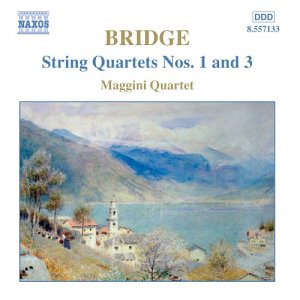
String Quartets 1 & 3 Composer: Frank Bridge Performers:. Maggini String Quartet Naxos Frank Bridge is a bit of a lost horse in the English stable of composers that includes such giants as Elgar, Vaughan Williams and, his student, Benjamin Britten. But he shouldn't be. No. 1, written in 1901, is a mature, fully realized work; No. 3, composed in 1927 is one of the pilars of 20th century chamber music. As always, the Maggini play magnificiently and the recording is first rate. |
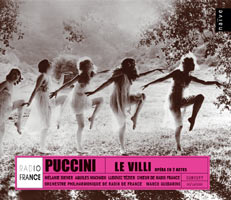
Le Villi Composer: Giacomo Puccini Conductor: Marco Guidarini Performer: Melanie Diener, Ludovic Tezier, et al. Radio France Chorus, French Radio Philharmonic Orchestra Naive Just
listening to young Puccini's first opera (as opposed to seeing it staged
and sung), you notice immediately that the big sweeping melodies, the ingenious
"hooks" are already there. Naive has also issued a Radio France recording
of Puccini’s second opera, Edgar,
written five years after Le Villi. In this more ambitious and
complicated work, Puccini develops his technique using a score that merges
stirring arias and ensembles.
|
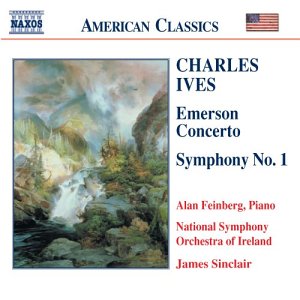
Emerson Concerto / Symphony 1 Composer: Charles Ives Performers: Alan Feinberg (piano), National Symphony Orchestra of Ireland, James Sinclair (conductor) Naxos Ives sketched the Emerson Concerto in 1907 but never fully finished it, although he used portions in other works. David G. Porter, a noted Ives scholar, was able to create a performing version which was premiered in 1998 by Alan Feinberg, the pianist on this premiere recording. The piece is extremely demanding, often abrasive, and demands exceptional virtuosity. Symphony No. 1 is fetching, but not as charateristic, of the great American maverick that followed. |
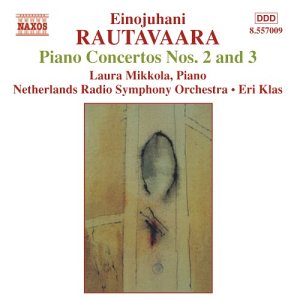
Piano Concertos 2 & 3 Composer: Einojuhani Rautavaara Performers: Laura Mikkola (piano), Netherlands Radio Symphony Orchestra, Eri Klas (conductor) Naxos The Finnish composer Rautavaara has enjoyed enormous success in recent years with his unique blend of northern lights impressionism and romanticism served up in an aura of modernity. His Cantus Articus is immensely popular, conjuring up associations of Messiean, although the latter is a much more important composer. The Third Piano Concerto from 1998 is forceful, drawings on the Russian school of pianism, although it not technically flashy until the finale. The Second, composed nine years earlier, is more traditional and Laura Mikkola, already on disc with a highly regarded account of the First Concerto, again provides an outstanding performance. |
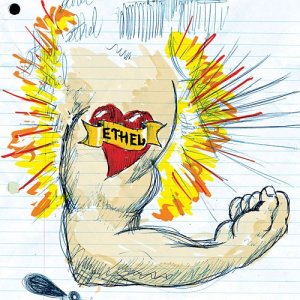
Ethel Composers: King, Kline, Reynolds, Ziporen Performers: Ethel Cantaloupe New
York's most daring string-quartet sensation, Ethel, makes its debut here
with a menu of the kind of hard-edged downtown music that has won the group
a big following in the NY new music scene. Todd Reynolds and
Mary Rowell, violins; Ralph Farris, viola; and Dorothy Lawson, cello—all
began their careers in New York as freelance musicians, playing difficult
music that relies heavily on non-classical sources but requires a virtuoso
classical ensemble to play. Its repertoire ranges from John King's energetic
blues transcriptions to the gnarly quartets of Julia Wolfe
and on Todd Reynolds' quirky
|
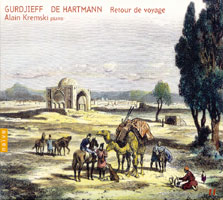
Return from a Journey Composers: Gurdjieff, De Hartmann, Performer: Kremski Naive Gurdjieff
was a Russian Aremenian spiritual master who, in addition to the main body
of his teaching created sacred dances, or Movements, as well as 200
or so musical compositions--all of which were were done in collaboration
with German composer Thomas de Hartmann at Gurdjieff's Institute
for the Harmonious Development of Man, near Paris, in the years 1925–27.
For many years, the pieces heard here were played only by De Hartmann or
another of Gurdjieff's disciples but in recent years they have attracted
the interest of a number of adventuresome pianists. Kremski plays
these exotic, vaguely oriental and oddly thematic pieces with great respect
and warmth.
|
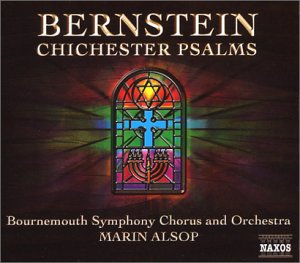 Chichester
Psalms
Chichester
Psalms
Composer: Leonard Bernstein Performers: Bournemouth Symphony Orchestra and Chorus, Marin Alsop (conductor) Naxos Commissioned in 1965 by the Dean of Chichester, Bernstein’s colorful Chichester Psalms is one of the composer’s most successful and accessible works on religious texts, contrasting spiritual austerity with impulsive rhythms in a contemplation of peace. The composer fashioned his Oscar nominated score to the 1954 movie On the Waterfront into a symphonic suite, skillfully capturing the oppression of the New York dockyards in the ’50s. The Three Dance Episodes were extracted from the popular On The Town, Bernstein's first successful foray into musical theatre. Bernstein protege Marin Alsop gets a robust performance from Bournemouth orchestra and chorus. |
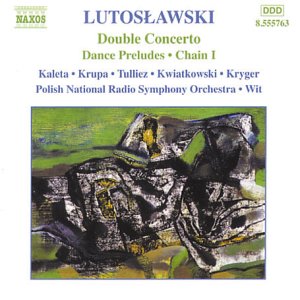
Double Concerto Composer: Witold Lutoslawski Performers: Polish National Radio Symphony, Antoni Wit Volume 8 in Naxos' indispensible survey of Lutoslawski's orchestra work brings us into lesser known territory but there are still treasures to be found. The Dance Preludes from 1955 is basically a five-movement clarinet concerto, with lots of interesting harmonies and rhythmic twists and turns. The Double Concerto for oboe and harp from 1990 rattles the ear a bit and has a demanding oboe part, beautifully played by Arkadiusz Krupa. The Children's Songs, gorgeously sung by the soprano, Urszula Kryger, are beguiling. |
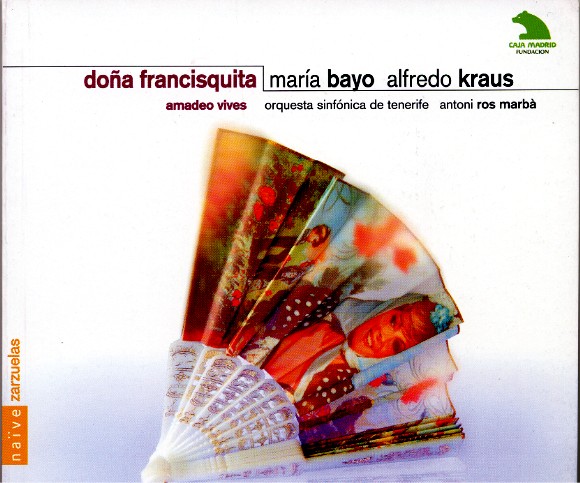
Doña Francisquita Composer: Amadeo Vives Performers: Maria Bayo, Alfredo Kraus, Orquesta Sinfonica de Tenerife, Antoni Ros Marba Naive A superb performance of Amadeo Vives' zarzuela masterpiece, sung with enormous vivacity and brio by the ravishing-voiced Maria Bayo and the sturdy Alfredo Kraus. With its nineteenth century Madrid setting, its roots in classical Spanish drama and its festive nocturnal amours, Doña Francisquita provides a retrospective on the romantic zarzuela tradition and its crowning glory. The work was immediately recognized not only as Vives’ masterpiece, but as the greatest full length zarzuela of its era. If you're not into zarzuela already, this is the perfect place to start your collection. |
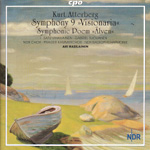
Symphony 9 Visionaria Composer: Kurt Atterberg Satu Vihavainen (mezzo-soprano); Gabriel Suovanen (baritone) NDR Choir, Prague Chamber Choir NDR Radio Philharmonic, Ari Rasilainen CPO The 9th and final symphony of Swedish composer Kurt Atterberg bears a superficial relationshp to Beethoven's 9th with its big, expresssive choral sound but Atterburg's world is a good deal less joyous. Atterberg's choice of texts reflects the lasting impact on his psyche made by World War II and the Korean War. The Poetic Edda, an Icelandic epic dating from around 1270, relates the visions of a wise prophetess (hence the Symphony's title "Sinfonia Visionaria") who foretells the creation of the world, the warring among gods, giants, and humans, the world's destruction, and finally its recreation. Atterberg uses mezzo-soprano and baritone soloists with chorus and large orchestra, as well as a quasi-oratorio form, to tell his epic tale. This is extraordinary symphony by a composer who is far too little-known in the musical world. |
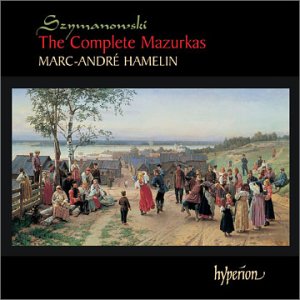
The Complete Mazurkas Composer: Karol Szymanowski Performer: Marc-Andre Hamelin Hyperion Marc-Andre Hamelin continues his extraordinary journey through the forgotten rivers and bayous of the modern piano repetoire with masterful performances of Szymanowski's Twenty Mazurkas, Op. 50, composed between 1926 and 1931. After assimilating the influence of Stravinsky, Szymanowski began looking for folk themes in Polish music to rival the Russian folk touches of the master. The Mazurka, a traditional Polish dance in three-quarter-time with an often erratic-seeming emphasis on the second beat, (and a favorite form for Chopin) offered great possibilities . These highly diverse pieces are more complex than Chopin, more modern and dissonant, yet also more muted and elusive. Still, Szymanowski remained too much a romantic to settle for anything less then flamboyant virtuosity--a quality that Hamelin possses by the truckload. |
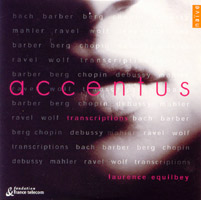
Accentus Composers: Transciptions: Bach, Barber, Berg, Chopin, Debussy, Mahler, Ravel, Wolf Peformers: : Choeur De Chambre Accentus, Equilbey Naive Worth having for the ravishing performances of Samuel Barber's "Adagio" and Mahler's "Adagietto from Symphony No. 5." |
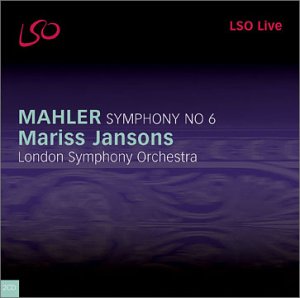
Symphony No. 6 Composer: Gustav Mahler Performer: London Symphony Orchestra; Mariss Jansons Label: LSO Live It is rare that you find a recording that you need listen to for only a minute to know a masterpiece is unfolding before your very ears. This stunning live performance of Mahler's "Tragic" symphony is one of the rare ones, From the first rhythmic thumps of the long and stately funeral march to the final faded chords, Mariss Jansons draws a passionate and committed performance from the LSO. Certain to be among the best of the year noninees. |

Wheel of Emptiness Composer: Jonathan Harvey Performers: Actus Cyprès CYP5604 English composer Jonathan Harvey is one of those modernists whose work is more frequently talked about then played. This rare recording contains five representative works ranging from the lyrical to the raw, built on instrumentations ranging from electroacoustical to the traditional. An excellent introduction to an unjustly neglected maverick. |
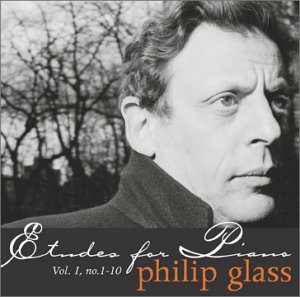
Piano Etudes 1 Composer: Philip Glass Performer: Philip Glass Orange Mountain Glass says he wrote these "studies" as fodder for his own concert performances and as a way of challenging himself as a pianist. But, they are much more important than that. They provide a real insight into how Glass composes and, although billed as sketches, sometimes are more rewarding to the ear and intellect than many of Glass's larger-scale works. Essential recording for the Glassologist. |
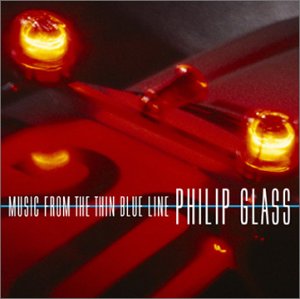
Music from the Thin Blue Line Composer: Philip Glass Orange Mountain Glass's hypnotic score for Errol Morris’ extraordinary 1988 documentary film entitled "The Thin Blue Line". Nonesuch Records released a CD of the film’s soundtrack that included the narration and interviews from the film but this Orange Mountain release contains the original score without the voice-over. The music is dark and brooding, full of tension appropriately for such a chilling film, and it stands well on its own. |
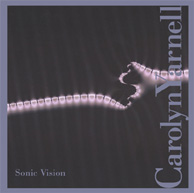
Sonic Vision Composer: Carolyn Yarnell Tzadik Inspired by the beauty and power of nature, the music of Carolyn Yarnell straddles the borders of minimalism, romanticism and Baroque. Sonic Vision, the first CD devoted entirely to her music, contains the powerful electronic composition Love God, a beautiful solo piece for Baroque flute, a minimalist suite for chamber ensemble and a powerful extended work for computer piano. Lyrical and mystical music that evokes volcanoes, birds and the Rocky Mountains. |
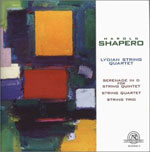
Chamber Music Composer; Harold Shapero Performers: Lydian String Quartet New World Records - Shapero’s (b. 1920) vastly underrated portfolio is one of the great undiscovered treasure troves of American neoclassicism. The String Trio, the String Quartet, the Serenade in D offer a broad-based introduction to Shapero’s compositional thought processes. Beautiful, committed playing by the Lydian String Quartet. |

Drumming Composer: Steve Reich Performer: Ictus, Synergy Vocals Cypres Reich's 1971 masterpiece gets a spirited workout by the Belgian new music group Ictus. Drumming is constructed around one single basic rhythmic-melodic pattern, for an imposing ensemble of percussion (bongos, marimbas, glockenspiel) joined by some female voices, a piccolo flute or a whistling part. The breathtaking feeling of simplicity/complexity in this work is transmitted with an amazing skill by the Belgians. |
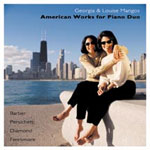
American Works for Piano Duo Composer(s): Barber, Persichetti, Diamond, Fennimore Performer (s): Georgia & Louis Mangos Cedille Records Barber's homage to the Plaza Hotel's Palm Court, Souvenirs, Op. 28, has never sounded better or more nostalgic and Joseph Fennimore's Crystal Stairs also invokes the quintessential American city. The real surprise here are the two pieces by Vincent Persichetti, which invoke a more dynamic and rough and tumble form of Americanism. The Mango sisters display formidable technique and taste. |
 |
Search WWWSearch www.sequenza21.com |
